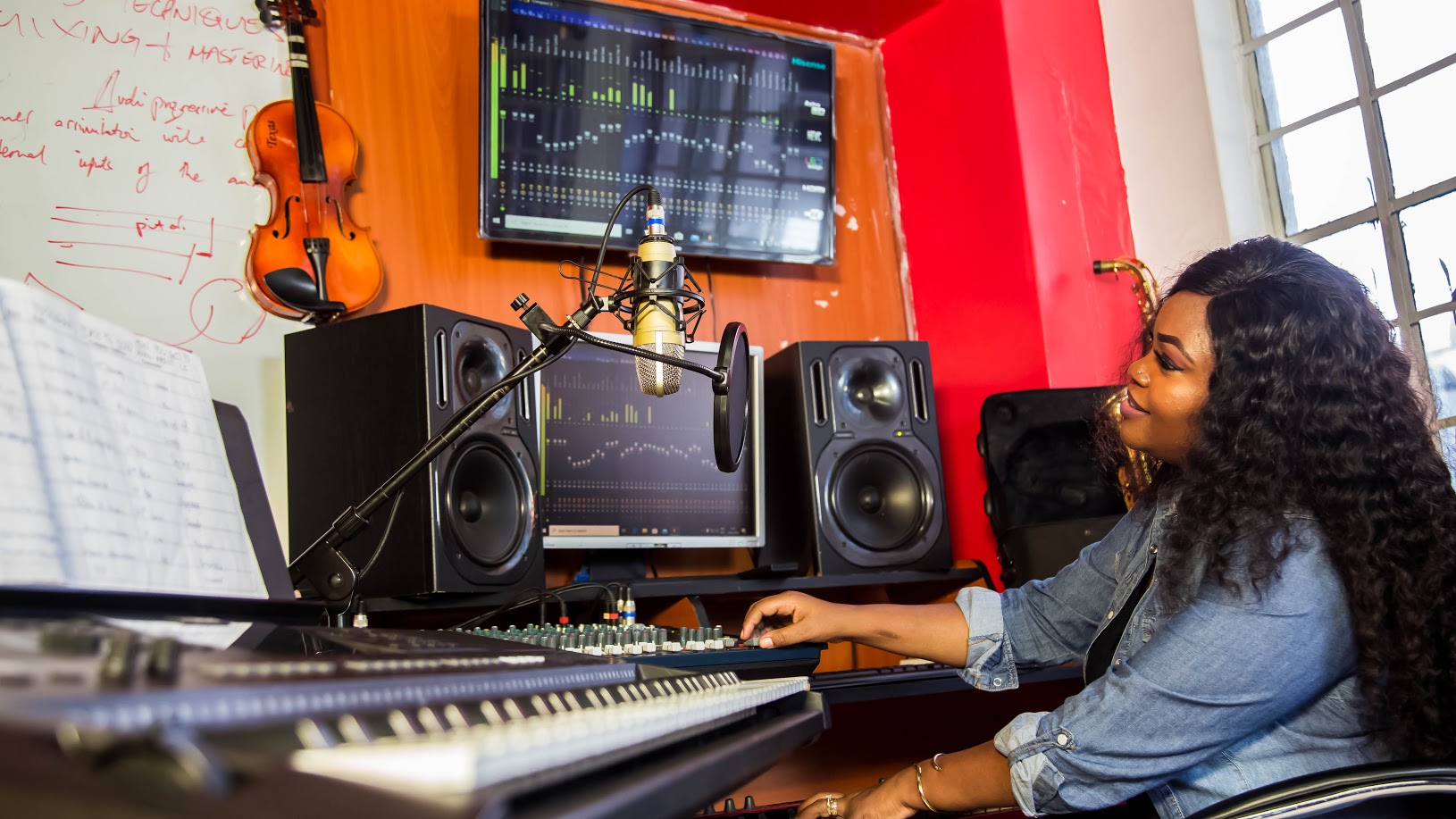Passionate about music and eager to turn your love for sound into a rewarding career? Look no further! Nairobi, Kenya, is a vibrant hub for music and offers a diverse range of sound engineering courses to equip you with the skills and knowledge needed to succeed in the industry.
Why Choose Sound Engineering at Kamata College?
-
- Thriving Music Scene: Nairobi boasts a dynamic music scene with a rich blend of traditional and contemporary sounds. This provides ample opportunities for hands-on experience, networking, and potential career pathways.
-
- Experienced Instructors: Many sound engineering courses in Nairobi are taught by industry professionals with years of experience in recording studios, live sound, and music production.
-
- State-of-the-Art Facilities: Reputable institutions often provide access to modern recording studios, mixing consoles, DAWs (Digital Audio Workstations), and other essential equipment.
-
- Career Opportunities: A successful sound engineering career can open doors to various roles, including:
-
- Recording Engineer: Capture and mix audio for music, film, and television.
-
- Live Sound Engineer: Mix and master sound for concerts, festivals, and other live events.
-
- Post-Production Engineer: Work on sound design and editing for films, games, and other media.
-
- Music Producer: Guide and collaborate with artists on the creative and technical aspects of music production.
-
- Career Opportunities: A successful sound engineering career can open doors to various roles, including:
Finding the Right Sound Engineering Course in Nairobi:
-
- Research Institutions: Explore reputable music schools, colleges, and training centers in Nairobi.
-
- Read Reviews: Check online reviews and testimonials from past students to gain insights into the quality of education and the effectiveness of the program.
-
- Visit Campuses: Schedule campus tours to experience the facilities firsthand and meet with instructors.
-
- Consider Your Learning Style: Choose a course that aligns with your learning style and career goals. Some programs offer flexible schedules, while others focus on intensive hands-on training.
-
- Look for Industry Connections: Inquire about internship opportunities and industry connections that the program offers to help you gain practical experience and build your professional network.
Key Skills Covered in Sound Engineering Courses:
-
- Acoustic Principles: Understanding sound waves, acoustics, and room treatment.
-
- Recording Techniques: Microphone techniques, signal flow, and recording studio setup.
-
- Digital Audio Workstations (DAWs): Proficiency in software like Pro Tools, Logic Pro, Ableton Live, and Cubase.
-
- Mixing and Mastering: Techniques for balancing audio levels, enhancing sound quality, and preparing audio for release.
-
- Signal Processing: Understanding and utilizing effects like EQ, compression, reverb, and delay.
-
- Live Sound Reinforcement: Setting up and operating sound systems for concerts and events.
Conclusion:
Pursuing a career in sound engineering can be a rewarding and fulfilling journey. With the right training and dedication, you can unlock your musical potential and contribute to the vibrant music industry in Nairobi and beyond.
Disclaimer: This article is for informational purposes only and should not be considered professional career advice.
Remember to:
-
- Replace this generic information with specific details about your school and its offerings.
-
- Include relevant keywords throughout the article.
-
- Optimize the article for search engines using relevant meta descriptions and image alt text.
-
- Promote the article on social media and other online platforms.
By following these tips, you can create an effective SEO article that attracts potential students to your sound engineering courses in Nairobi.
I operate a school of Music Production and sound engineering in Nairobi Kenya. Write for me an SEO article with sound engineering course in Nairobi as keywords. My School is called Kamata Music School.
Here’s an SEO article targeting “sound engineering courses in Nairobi” with a focus on your school, Kamata Music School:
Title: Unlock Your Musical Vision: Sound Engineering Courses at Kamata Music School in Nairobi
Introduction:
Aspiring sound engineers in Nairobi, are you ready to transform your passion for music into a thriving career? Kamata Music School offers comprehensive and industry-relevant sound engineering courses designed to equip you with the skills and knowledge to excel in this exciting field.
Why Choose Kamata Music School?
-
- Experienced & Passionate Instructors: Learn from seasoned industry professionals with years of hands-on experience in recording studios, live sound, and music production. Our instructors are not just teachers, but mentors who are dedicated to your success.
-
- State-of-the-Art Facilities: Immerse yourself in a world-class learning environment. Kamata Music School boasts modern recording studios equipped with industry-standard gear, including professional mixing consoles, DAWs (Digital Audio Workstations), and high-quality microphones.
-
- Industry Connections: We foster strong relationships with industry professionals, offering valuable networking opportunities and potential internship placements to help you gain real-world experience.
-
- Personalized Learning: Our courses cater to diverse learning styles, offering a blend of theoretical knowledge and practical, hands-on training.
-
- Career-Focused Curriculum: Our curriculum is meticulously designed to prepare you for a successful career in various sound engineering roles, including recording engineer, live sound engineer, post-production engineer, and music producer.
Sound Engineering Courses at Kamata Music School:
-
- [Course 1 Name]: [Brief description, e.g., A comprehensive program covering foundational concepts in acoustics, recording techniques, and basic mixing.]
-
- [Course 2 Name]: [Brief description, e.g., An advanced program focusing on advanced mixing and mastering techniques, live sound reinforcement, and music production workflows.]
-
- [Course 3 Name]: [Brief description, e.g., A specialized program in [specific area, e.g., Music Production for Electronic Music, Film Sound Design]]
Key Skills You’ll Acquire:
-
- Proficiency in DAWs: Master industry-standard software like Pro Tools, Logic Pro, Ableton Live, and Cubase.
-
- Recording Techniques: Learn microphone techniques, signal flow, and recording studio setup.
-
- Mixing and Mastering: Develop expert skills in balancing audio levels, enhancing sound quality, and preparing audio for release.
-
- Acoustic Principles: Gain a deep understanding of sound waves, acoustics, and room treatment.
-
- Signal Processing: Learn to effectively utilize EQ, compression, reverb, and delay.
-
- Live Sound Reinforcement: Acquire the skills to set up and operate sound systems for concerts and events.
Join the Kamata Music School Community:
-
- Visit our website: [Insert your website address]
-
- Contact us: [Insert phone number and email address]
-
- Follow us on social media: [Insert social media links]
Conclusion:
At Kamata Music School, we believe in nurturing your musical passion and empowering you with the skills to succeed in the dynamic world of sound engineering. Join our vibrant community of aspiring and accomplished musicians, and embark on a rewarding journey of musical discovery.


Comments are closed